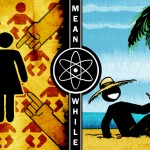Every Thursday in Citizenship Confusion, Alan Noble discusses how we confuse our heavenly citizenship with citizenship to the state, culture, and the world.
Before the presidential debates I was confident that Barack Obama would handily beat Mitt Romney. Despite the poor economy and the debates over Obamacare, I couldn’t see a very moderate Republican Mormon with a plastic smile and few distinctives beyond being Not-Obama beating our President. Then the first debate happened. By the time the final debate ended on Tuesday, the impossible happened—I changed my opinion of Romney based on his debate performance. Now, there’s still plenty I dislike about his politics, but he did come off far more eloquent and reasonable than I expected, based on his GOP Primaries debate performances. And the fact that he was no more hawkish than Obama was attractive to me, particularly since a very vocal segment of the Right is adamant about forcefully and directly combating Islam—rather than radical Muslims.
But, more important, Romney’s debate performances persuaded a lot of other people, if polls are to be trusted. And now the easy Obama victory has turned into a very close race. And if we end up having a President Romney, Christians are going to have to think carefully about how to support and speak of our president without condoning Mormonism or conflating it with Christianity.
This issue wasn’t a problem for most Christians with President Obama, because most Christians who are inclined to invoke their Faith when discussing politics and politicians tend to be conservative, and most or at least many conservative Christians had written Obama off as either a liberal/non-evangelical Christian, a heretic, a Muslim, or an Atheist Communist. There really was no temptation to start talking about how God was guiding Obama’s policy decisions to bless America, or to pray that Obama would follow God’s heart in his presidential actions, or that Obama would be a righteous leader of a Christian Nation. Whatever he was, we were pretty sure he wasn’t a Christian president, except in name.
But Mitt Romney is a Republican, and one who promises to save us from a godless Democrat with godless policies, so our inclination is going to be to think of him as doing God’s work, just as George W. Bush was often considered by some evangelicals as a president who sought after God’s heart. It is natural for us to think of the Republican president as in someway a representative of Christian values and faith. But Romney is a Mormon, and if he is seeking after “god’s heart” it is not the God of orthodox Christianity.
I suspect that if Romney gets elected, conservative evangelicals are going to find themselves in the uncomfortable and unfamiliar position of having to defend and support a president who will evoke “god” for his causes but who is in truth the follower of a false god, at best a member of a heretical Christian sect and at worst a member of a cult.
An ugly example of this tension can be seen in the Billy Graham Evangelic Association’s decision to remove a page on their Web site which described the Church of the Latter Day Saints as a cult:
The explanation they gave about removing the pages was that they “removed the information from the website because we do not wish to participate in a theological debate about something that has become politicized during this campaign.” Christianity Today has an interesting piece where they asked several Christian experts to weigh-in on the BGEA’s decision; surprisingly, to me at least, a number of theologians I respect were pleased with the removal of the “cult” label, which they saw as an unhelpful and pejorative term. However, in the context of this page, “cult” is defined in a very specific way which essentially means a heretical religious sect claiming to be Christian—which is a pretty accurate description of the LDS. Thankfully, other theologians pointed out that the BGEA was essentially placing a political goal (Romney’s election) over a theological truth (the heresy of Mormonism).
In any case, my point is that it is easy, very easy for conservative evangelicals to want to envision Romney as a fellow believer. And I worry that if he gets elected, some Christians will view him as a representative of our faith, which may manifest in the way we talk about him, pray for him, support him, and even the way we conceive of Mormonism. Is it a cult? A heretical sect? A false religion? Or merely another form of Christianity, albeit a misguided one?
I do not believe that Romney’s religion should preclude Christians voting for him; however, I do believe that if we vote for him, and if he gets elected, we must understand that the world is watching us. Will we conflate orthodox Christianity with a heresy in our public prayers, at political rallies, and prayer breakfasts? Will we conflate them in our slogans? In our political rhetoric? In our minds will we think of him as a member of the Body of Christ?
It is easy to denounce Mormonism outright as a cult (unless you’re the BGEA), but it’s much harder to guard the subtle ways we conceive of a Conservative President and his relationship to our Faith. These are questions that Christians need to ask themselves in the coming weeks, or risk defaming the Gospel for political gains.












